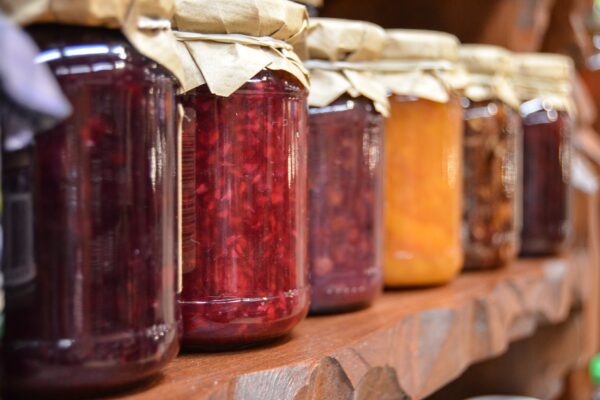
If you’re anything like me, you’re all about getting bang for your buck – almost nothing goes to waste and everything is used until the last drop. This post is all about helping you get the most out of your groceries. We’re not about throwing away dollars on spoilt or wasted food! These food storage tips will make your food last longer and help you reduce waste, giving you the most out of every single shopping trip.
Let’s start with the basics!
General Food Storage Guidelines
- Keep your fridge clutter-free! You don’t want to end up like me – buying goods that are already in my refrigerator. Yes, the saying is true, “out of sight, out of mind.” An overcrowded fridge also reduces airflow and creates both hot and cold spots throughout the interior. This could lead to spoilage of foods stored in certain areas of the refrigerator.
- Periodically check that your refrigerator temperature is optimal (it should be at least 40 degrees Fahrenheit or just below 5 degrees Celsius) to reduce spoilage and the risk of foodborne illnesses.
- Labelling foods with a time and date (from when they were purchased or first placed in the freezer), and checking expiration dates could be extremely beneficial in ensuring foods are used up at peak freshness.
- Ensure food that should be stored in an enclosed container (like raw meat, cooked foods, frozen items) are properly sealed to maintain freshness.
Dairy

Dairy products should be stored where it’s coldest, and this is usually at the back of the fridge. This is also the area with the most consistent temperature. And while convenient AVOID placing dairy items in the fridge door where it is susceptible to warmer air from constant opening and closing. Wrap cheese in wax paper or beeswax paper to maintain freshness. Keep your eggs in their original packaging and store them in the coldest part of the fridge, not in egg cups or holders in the refrigerator door.
Meat

Keep raw meat on the bottom shelf to avoid juices dripping onto other foods, causing cross-contamination. To further avoid cross-contamination, place meat in a well-sealed container or add a plate to catch any potential spillage. According to Healthline, uncured raw meat generally lasts safely in the fridge for two to three days. For longer storage, you may freeze in airtight packaging for up to several months.
Fruits & Vegetables

Refrigerator space is precious real estate and many of your foods are in constant competition for a spot. Luckily, not all fruits and vegetables need to live in the refrigerator. Produce like citrus, bananas, avocados, tomatoes, potatoes can all be stored at room temperature in a cool dark place. Onions and garlic thrive in cool (not cold), dark, dry spaces. Unripe fruits like mangoes, pineapples and papaya store well at room temperature. Fruits like apples, however, last much longer in the refrigerator and remain crisper there as well. In general, fruit and vegetables that are already sliced, chopped or peeled should be stored in the refrigerator.
Allow your fruits and vegetables to live separate lives and store them away from each other. Ripe fruits give off ethylene gas which causes other produce nearby to ripen and spoil. Foods like onions and potatoes should NEVER be stored together. They bring out gases and moisture in each other that can lead to faster spoiling.
Bonus tip: Fruits should only be washed when ready to consume as the added moisture causes them to spoil more quickly.
Herbs

Treat your herbs like a bouquet of flowers. According to the Pioneer Woman, the best way to store tender herbs (those with soft stems) like cilantro, parsley and mint, is to trim the stems before placing the herbs upright in a tall glass or jar filled with about an inch of water. Then loosely cover with a bit of plastic wrap or a plastic bag and store in the fridge. For woody herbs (those with hard stems) like rosemary, thyme and oregano, roll up loosely in damp paper towel and place in a re-sealable plastic bag or plastic wrap before storing in the fridge.
Leafy Greens

Leafy greens like lettuce and patchoi (bok choy) are notorious for drying up and wilting in just a few days. To keep these greens crisp and fresh for up to a week, remove any wilted or damaged leaves. Then, gently wash the remaining leaves to release any dirt or debris. Pat dry with paper towels or spin dry in a salad spinner (great investment, especially for keeping greens crisp). Wrap in a few paper towels before placing them in the crisper drawer of your refrigerator. The paper towels will absorb any excess moisture developed in the fridge, thereby keeping the greens dry and crisp.
Grains and Flours

When it comes to grains and flours (nut flours included), heat, air, and moisture are the enemies! They should be stored in air-tight containers in a cool dark dry place, to maintain freshness. Flour can last in the pantry for up to a year but is best kept fresh in the freezer. If you’re not going to use it frequently, it can be stored in the freezer for up to two years but ensure that it is brought to room temperature before use. Grains, on the other hand, are fresh for up to six months in the pantry but can be stored for up to a year in the freezer.
Both grains and flour are usually bought in bulk, which is a great way to save money and reduce packaging. So, you want to ensure that they are stored correctly and aren’t wasted. Thus, as an added measure, try labelling containers so that you know how long you’ve had your grains and flour.
Bread

Bread is fine on the countertop or a cool dry place for a few days and is kept freshest in paper bags (not plastic). Storing on top of the refrigerator is a no-no! Bread stored in paper bags on the refrigerator will dry out and those in plastic will mould faster. This is because of all the heat the refrigerator gives off. Freezing bread keeps it freshest for the longest time possible. To freeze, wrap tightly in plastic wrap and place in a freezer bag before storing. It only takes a few minutes to defrost on the countertop and can then be eaten as is, or heated.
Bonus tip: Better to freeze sliced than whole as you can take what you need rather than defrosting the entire bread.
With these tips, you’re sure to extend the life of your groceries, reduce household waste, and put back some dollars where they belong…in your pocket, not the garbage.
Discovered any quick wins? Let me know in the comments below what your best tip is for keeping food fresh.





Great tips. These will be very useful for me.
Awesome!
This post was jam packed with gems. Thanks!
Glad you enjoyed it!
Very informative, thank you.
♥️